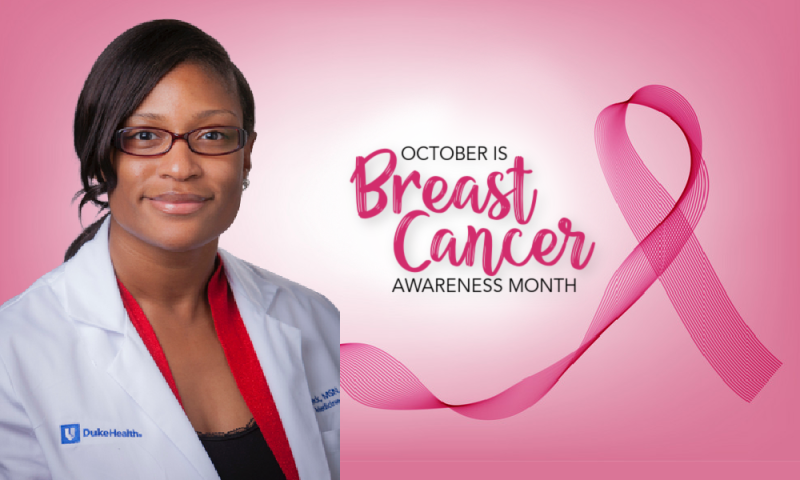
Valerie Keck, FNP-C, is a nurse practitioner at the Duke Outpatient Clinic (DOC) who specializes in primary care for the under-served community. Recently, Keck has also focused efforts to support a project on educating the Durham population of knowing the signs and symptoms of inflammatory breast cancer.
Inflammatory breast cancer (IBC) is a considered a rare, aggressive form of breast cancer, with accounting for 1 in 5 breast cancer diagnoses in the U.S. It is often found in the later stages as it can mimic certain types of other breast infections.
Keck joins other advanced practice providers to partake in a fellowship program at Duke part of the Duke Advanced Practice Provider Leadership Institute (APPLI). This yearly cohort allows advanced practice providers to advance their careers through mentoring, seminars, and project lead opportunities. Keck’s project partners with Gayathri Devi, PhD, associate professor in the Duke Department of Surgery, who is researching inflammatory breast cancer.
Keck’s project focuses on developing a patient survey that will be used to gain insight on our community’s general knowledge of this IBC. More specifically, inflammatory breast cancer disproportionately effects African American women, so Keck’s survey will guide future research on if the knowledge gap is specifically among those women or within the general public. In conjunction, Keck hopes this will improve the knowledge of providers to consider this diagnosis when a patient presents with key symptoms.
“Our ultimate goal is to get this knowledge of IBC on everyone’s radar, providers and our general population,” shares Keck. "IBC is considered a rare cancer with a very low survival rate if diagnosed too late, so our hope is to educate our providers and members of the community of signs and symptoms to recognize and look for.”
The patient survey being developed by Keck will be initially disseminated to patients seen at the DOC, target deployment time is early 2023.
Keck’s desire to raise awareness for breast cancer, specifically inflammatory breast cancer, goes beyond the month of October, when it’s recognized by the American Cancer Society.
“I have a strong family history of breast cancer and this project has given me the opportunity to learn more about this disease, recognize it, and be able to educate my family and patients on what to look out for so they themselves feel confident on watching for symptoms,” says Keck. “This is especially important to me as being a woman of color myself – this type of breast cancer doesn’t show up on mammograms – so education and raising awareness is key.”